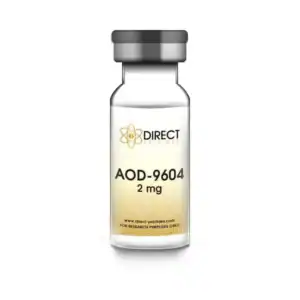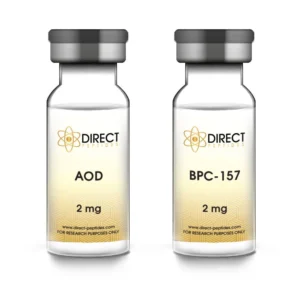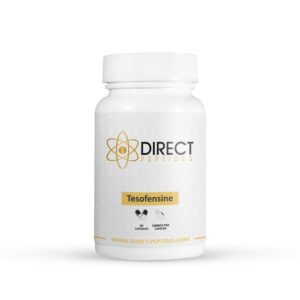AOD-9604 weight loss peptide has emerged as a promising research tool for fat burning and weight management. A synthetic peptide derived from the C-terminal fragment of Human Growth Hormone (HGH), it holds significant potential for enhancing fat metabolism without the negative effects typically associated with HGH.
Although AOD-9604 weight loss has shown potential in clinical trials, it is important to note that it is still strictly for research purposes and not for human use yet. Researchers continue to study its efficacy, and early results show promise for combating obesity and improving body composition.
AOD-9604 is a synthetic fragment of human growth hormone (HGH) and human GH, designed to target fat metabolism. It promotes fat breakdown (lipolysis) and prevents fat storage (lipogenesis), aiding fat loss and metabolic health. Unlike HGH, AOD-9604 focuses solely on fat metabolism, making it a safer weight management research option.
 The AOD-9604 weight loss peptide is at the center of research into obesity and fat loss. It helps stimulate fat breakdown and regulates the process by which the body stores and burns fat by stimulating the pituitary gland.
The AOD-9604 weight loss peptide is at the center of research into obesity and fat loss. It helps stimulate fat breakdown and regulates the process by which the body stores and burns fat by stimulating the pituitary gland.
This peptide, composed of modified amino acids, can help improve body composition by reducing body fat while promoting lean muscle mass.
Unlike full HGH, which can lead to side effects like increased growth or changes in blood sugar levels, AOD-9604 offers a more targeted approach to fat reduction without these risks.
Discover more about AOD-9604 and its fat-burning benefits on the Direct Peptides Lithuania AOD-9604 category page.
 The AOD-9604 & BPC-157 stack combines AOD-9604 with BPC-157, a peptide known for its healing properties and its ability to address inflammation. This combination may offer additional benefits for both weight loss and recovery.
The AOD-9604 & BPC-157 stack combines AOD-9604 with BPC-157, a peptide known for its healing properties and its ability to address inflammation. This combination may offer additional benefits for both weight loss and recovery.
While AOD-9604 focuses on breaking down fat and improving metabolism, BPC-157 aids in muscle recovery and tissue repair.
Together, they provide a comprehensive approach to improving body composition, especially for those recovering from intense physical activity.
Learn about the benefits of the AOD-9604 BPC stack for recovery and fat loss on the Direct Peptides Lithuania AOD-9604 & BPC-157 stack product page.
Tesofensine is another peptide gaining attention for its role in weight loss. By inhibiting the reuptake of neurotransmitters like serotonin, dopamine, and norepinephrine, Tesofensine reduces hunger and increases energy expenditure.
This peptide has shown potential in reducing appetite and boosting metabolism, making it a useful tool for researchers exploring non-surgical treatments for obesity.
Explore the weight loss potential of Tesofensine on the Direct Peptides Lithuania Tesofensine category page.
AOD-9604 weight loss peptide works by mimicking the natural fat-burning process that human growth hormone facilitates. It promotes lipolysis, helping to break down fat and prevent the formation of new fat stores.
This targeted mechanism is particularly beneficial for those struggling with obesity, as it helps reduce body fat without affecting appetite. Importantly, it does not interfere with normal food intake, making it a viable option for research on safe and sustainable weight loss methods.
Shop Peptide Supplies from Direct Peptides Lithuania for all your reconstitution requirements.
AOD-9604 offers several advantages in the realm of fat metabolism and weight loss:
Another significant benefit of AOD-9604 is its ability to prevent the storage of fat. By inhibiting lipogenesis, the peptide helps reduce the transformation of calories into body fat, making it easier to maintain a healthy body composition. This action not only supports weight loss but also aids in long-term fat management.
While AOD-9604 is primarily researched for its fat-burning properties, it may also offer benefits for muscle recovery. For individuals engaged in intense physical activity, the peptide’s role in reducing body fat could lead to enhanced energy balance and faster recovery times after exercise.
Emerging research suggests that AOD-9604 may play a role in promoting bone and cartilage health. While still in the early stages, some studies have indicated that it could aid in bone regeneration and joint health, offering potential benefits for people dealing with age-related bone loss or injury.
AOD-9604 weight loss peptide may also help regulate blood sugar levels, similar to semaglutide. By improving insulin sensitivity, it could assist in managing conditions like Type 2 diabetes, offering a potential dual benefit for weight loss and blood sugar control.
While AOD-9604 shows promise in clinical research, it can cause mild side effects in some users, including:
AOD-9604 weight loss peptide presents a unique opportunity for researchers exploring non-surgical options for fat loss and body composition improvement. Its ability to stimulate fat burning without affecting appetite makes it an appealing choice for weight loss studies.
The combination of AOD-9604 with peptides like BPC-157 or the use of Tesofensine further enhances its potential for achieving optimal fat loss and muscle recovery.
Although still in the research phase, AOD-9604 shows significant promise for those seeking effective, sustainable weight loss solutions and could ultimately play a crucial role in the fight against obesity.
[1] Misra M. Obesity pharmacotherapy: current perspectives and future directions. Curr Cardiol Rev. 2013 Feb 1;9(1):33-54.
[2] Ng FM, Sun J, Sharma L, Libinaka R, Jiang WJ, Gianello R. Metabolic studies of a synthetic lipolytic domain (AOD9604) of human growth hormone. Horm Res. 2000;53(6):274-8.
[3] Valentino MA, Lin JE, Waldman SA. Central and peripheral molecular targets for antiobesity pharmacotherapy. Clin Pharmacol Ther. 2010 Jun;87(6):652-62.
[4] Kwon DR, Park GY. Effect of Intra-articular Injection of AOD9604 with or without Hyaluronic Acid in Rabbit Osteoarthritis Model. Ann Clin Lab Sci. 2015 Summer;45(4):426-32.
Shop ALL Research Grade Peptides online today from Direct Peptides , our comprehensive peptide list guarantees +99% Purity.

Tesofensine Capsules
£159.66 Select options This product has multiple variants. The options may be chosen on the product page
TWIN PACKS
TWIN PACKS
TWIN PACKS
AOD-9604 Peptide Vial
£18.33 – £218.79Price range: £18.33 through £218.79 Select options This product has multiple variants. The options may be chosen on the product page
AOD-9604 2mg Pre-Mixed Pen
£20.91 – £56.46Price range: £20.91 through £56.46 Select options This product has multiple variants. The options may be chosen on the product page
AOD-9604 BPC-157 Peptide Stack
£26.81 – £35.79Price range: £26.81 through £35.79 Select options This product has multiple variants. The options may be chosen on the product pageALL CONTENT AND PRODUCT INFORMATION AVAILABLE ON THIS WEBSITE IS FOR EDUCATIONAL PURPOSES ONLY.
DISCLAIMER: These products are intended solely as a research chemical only. This classification allows for their use only for research development and laboratory studies. The information available on our Lithuania Direct Peptides website: https://direct-peptides.com is provided for educational purposes only. These products are not for human or animal use or consumption in any manner. Handling of these products should be limited to suitably qualified professionals. They are not to be classified as a drug, food, cosmetic, or medicinal product and must not be mislabelled or used as such.